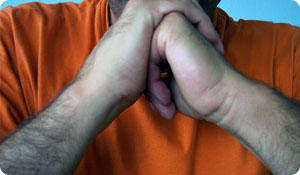
While cracking your knuckles may be irksome to those around you, it probably doesn't raise your risk for developing arthritis, according to limited research on the topic. However, there is some evidence showing that habitual knuckle cracking may cause damage to the ligaments surrounding the joint or dislocation of the tendons (attachments of muscles to bone) in the knuckle, potentially reducing grip strength over time.
Joint cracking results from the stretching of the joint capsule, which is filled with a liquid called synovial fluid that lubricates the joints. Sometimes a bubble of gas forms in the synovial fluid. It's this gas that causes the "popping" sound your knuckles make when you crack them.
Breaking the Knuckle-Cracking Habit
If your knuckle cracking is causing you discomfort, check with your doctor for recommendations on how you can best break the habit. You can also try these five tips:
1. Set an amount of time to stop. For example, tell yourself that you are not going to crack your knuckles for one day and then keep increasing the time frame.
2. Reward yourself for stopping. After you've successfully refrained from cracking your knuckles for a certain period of time, say a week or a month, do something nice for yourself or buy yourself a treat.
3. Wear a rubber band around your wrist and when you feel the urge to crack your knuckle, snap the band instead. It may help train your brain to associate knuckle cracking with pain and stop your urge.
4. Try hypnosis. Although not a cure, hypnosis is a useful tool to help you break a bad habit. Talk with your doctor to determine if hypnosis can be useful to you and ask for a recommendation for a qualified hypnotherapist.
5. Perform hand stretches. When your hands get cramped or tired, instead of cracking your fingers for relief, try bending and stretching them to get more oxygen to the muscles. Stretching your fingers and hand will also likely ease your urge to crack your knuckles. These exercises for your hand, wrist and fingers will help increase their flexibility and strength:
- Rotate your wrist up and down and from side to side.
- Stretch your fingers far apart, then relax them and repeat.
- Hold a rubber ball in your hand and squeeze.
- Make a fist and then open your hand and spread your fingers as far as possible. Hold the position for three to five seconds.
Sources:
hopkins-arthritis.org/arthritis-news/2007/knuckle-cracking-and-arthritis.html;





